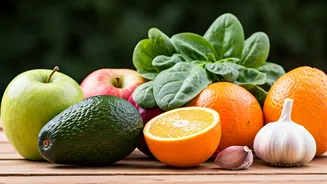Oats: Heart's Ally
Oats are a champion food for managing cholesterol. They are packed with soluble fiber, specifically beta-glucan. This fiber acts like a sponge, absorbing
cholesterol in the digestive system, which reduces its absorption into the bloodstream. Including oats in your diet is simple; a bowl of oatmeal for breakfast is a great start. Additionally, you can add oats to smoothies, muffins, or even use them as a coating for baked goods. Eating 1.5 cups of cooked oatmeal daily can lower LDL (bad) cholesterol by 5% to 8%. This makes oats a convenient and effective way to start your journey towards healthier cholesterol levels. The consistent consumption of oats can be a sustainable dietary habit to maintain heart health over the long term. Remember, small, consistent changes make a big impact.
Beans: Fiber Powerhouse
Beans, belonging to the legume family, are another fantastic food to incorporate into your diet for cholesterol management. Similar to oats, beans are rich in soluble fiber. This type of fiber helps to bind cholesterol in the digestive tract, preventing its absorption. Incorporating beans is surprisingly easy, whether it is in soups, salads, or as a side dish. Varieties such as kidney beans, black beans, and chickpeas offer great versatility in cooking. Including even a half-cup of beans daily can contribute to lower cholesterol levels. The nutritional benefits of beans extend beyond cholesterol management; they also provide essential nutrients such as protein and other vitamins. This makes them a comprehensive addition to a heart-healthy diet. Regular consumption of beans aligns with long-term heart health goals.
Nuts: Healthy Fats
Nuts, particularly almonds, walnuts, and cashews, are beneficial because they contain healthy fats, fiber, and plant sterols. Plant sterols are compounds that can help block the absorption of cholesterol in the gut. These fats primarily consist of monounsaturated and polyunsaturated fats, which can help reduce LDL cholesterol levels when eaten in moderation. Aim to consume about a handful of nuts daily as a snack or add them to your meals. Nuts are a great addition to salads, yogurt, or even as a topping on your oatmeal. Keep in mind that nuts are calorie-dense, so it's essential to practice portion control. Opting for unsalted nuts is best to avoid extra sodium, which can negatively affect heart health. Regular consumption of nuts can be a sustainable and pleasant way to maintain a heart-healthy lifestyle, contributing to long-term well-being.
Fatty Fish: Omega Boost
Fatty fish, such as salmon, mackerel, and tuna, are excellent sources of omega-3 fatty acids. These essential fatty acids are beneficial for reducing triglycerides, a type of fat in your blood, and also help raise HDL (good) cholesterol levels. Consuming fatty fish twice a week can be an effective way to improve your heart health. Cooking methods include grilling, baking, or steaming, which can help preserve the beneficial nutrients. Omega-3s also have anti-inflammatory properties, which contribute to overall cardiovascular well-being. Adding fatty fish to your diet can provide several health benefits beyond cholesterol management. This makes it a great choice for long-term health, helping to prevent heart disease. For those who do not eat fish, supplements of omega-3 can be considered, but dietary sources are always preferred.
Fruits: Antioxidant Power
Fruits, such as apples, grapes, strawberries, and citrus fruits, contain soluble fiber and pectin, which help lower cholesterol levels. These fruits also contain antioxidants that protect the heart from damage. Consuming a variety of fruits daily is a simple and enjoyable way to improve your heart health. Adding fruits to your breakfast, snacks, or even desserts can be a great way to meet your daily fruit requirements. Incorporating fruits into your diet helps keep your digestive system healthy due to its high fiber content. The natural sweetness of fruits can satisfy sugar cravings. The consumption of fruits regularly supports a healthy diet that can potentially reduce the risk of heart disease. Choose seasonal fruits to keep things interesting and maximize nutrient intake.
Vegetables: Nutrient Rich
Vegetables are packed with nutrients, fiber, and vitamins that contribute to lower cholesterol levels. Vegetables such as spinach, kale, and other leafy greens are particularly beneficial. They are low in calories and high in fiber, which helps bind cholesterol. Aim to fill at least half of your plate with vegetables at each meal. Steaming, grilling, or roasting are healthy ways to prepare vegetables without adding excessive fats. The fiber in vegetables also helps in weight management, which is closely linked to cholesterol levels. Vegetables provide antioxidants that protect the body against inflammation. Vegetables are an essential component of a balanced diet and can be eaten in many ways, making it an easy task to incorporate them into your daily meal plan to ensure heart health.
Olive Oil: Heart Healthy
Olive oil, especially extra virgin olive oil, is a source of monounsaturated fats. Replacing saturated fats (found in butter and animal fats) with olive oil can help reduce LDL cholesterol. Use olive oil in cooking, for salad dressings, or as a finishing drizzle on your dishes. Make sure to use it in moderation since it is still a fat and contains calories. Choosing extra virgin olive oil ensures you are getting a less processed product, which means more antioxidants and nutrients. Incorporating olive oil can also add a pleasant flavor and richness to your meals. Make use of olive oil while keeping an eye on your overall calorie intake. Make olive oil a consistent part of your dietary choices to support your heart health, and enjoy the benefits it brings.















